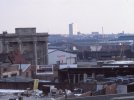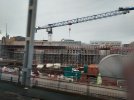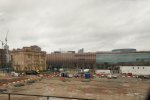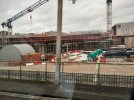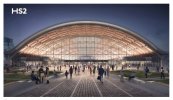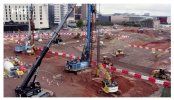-
Welcome to this forum . We are a worldwide group with a common interest in Birmingham and its history. While here, please follow a few simple rules. We ask that you respect other members, thank those who have helped you and please keep your contributions on-topic with the thread.
We do hope you enjoy your visit. BHF Admin Team
You are using an out of date browser. It may not display this or other websites correctly.
You should upgrade or use an alternative browser.
You should upgrade or use an alternative browser.
New HS2 Station in Curzon Street
- Thread starter dek carr
- Start date
pistonvalve
master brummie
Its a pity the proposed High speed line does not connect with HS1 at or near St Pancras so us 'living north of Watford' could have direct access to the Tunnel.
guilbert53
master brummie
I was up in Eastside last weekend and took a panorama picture of the Curzon Street site. This shows the huge site that is available for this new station (if it ever gets built).
See here
https://www.skyscrapercity.com/showpost.php?p=53275641&postcount=39
If you want to see all my panoramas of the Eastside area look here:
https://www.skyscrapercity.com/showthread.php?t=1024483
See here
https://www.skyscrapercity.com/showpost.php?p=53275641&postcount=39
If you want to see all my panoramas of the Eastside area look here:
https://www.skyscrapercity.com/showthread.php?t=1024483
N
Neville Philpott
Guest
Has anyone ever had the good fortune of seeing inside the old London-Birmingham railway terminus?
Phil
Gone, but not forgotten.
lencops
gone but not forgotten
DavidGrain
master brummie
[[/ATTACH]
If I get this right as I have never posted an attachment before. See attached for plan of where the new station will go. The Report from High Speed 2 Ltd calls the new station Fazeley Street but Andrew Adonis, the Transport Secretary calls it Curzon Street.
In fact if you look at the attached map you will see that the entrance will be in Moor Street at the back of the Pavilions View attachment 48529
Just seen the news where will the new track run? Dek:shocked:
If I get this right as I have never posted an attachment before. See attached for plan of where the new station will go. The Report from High Speed 2 Ltd calls the new station Fazeley Street but Andrew Adonis, the Transport Secretary calls it Curzon Street.
In fact if you look at the attached map you will see that the entrance will be in Moor Street at the back of the Pavilions View attachment 48529
guilbert53
master brummie
[If I get this right as I have never posted an attachment before. See attached for plan of where the new station will go. The Report from High Speed 2 Ltd calls the new station Fazeley Street but Andrew Adonis, the Transport Secretary calls it Curzon Street.
Well your attachment worked as I was able to open it.
I bet in the end it is called neither Fazeley Street or Curzon Street, they will want a "grander" sounding name like Birmingham Central or some such (even though it wont be in the centre)
Heartland
master brummie
MWS
from Bham
Work still progressing for the new tracks into Curzon St...
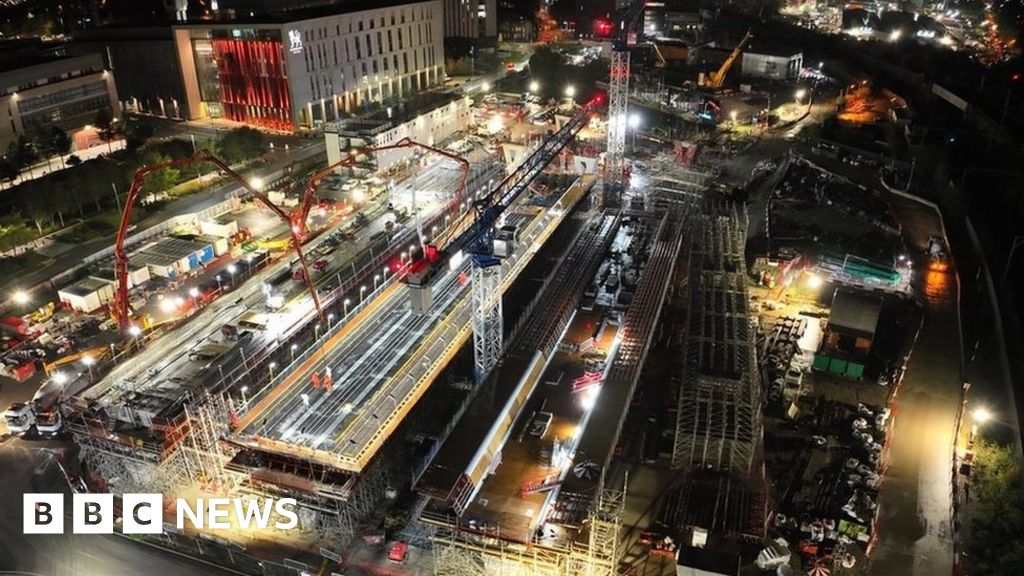

Concrete poured at night for Birmingham HS2 viaduct
HS2 says new images show "huge progress" on its first viaduct in the city.
www.bbc.co.uk
Heartland
master brummie
Whilst a date has been made for construction of the HS 2 station at Curzon Street to start from a chronological point of view the work started earlier and the station site is exclusive of the viaducts which have been under construction for a lengthy period of time.
New Canal Street has been partly dug up and there are different piles of earth across the site. The difficulty of making the metro through here is apparent and it has been announced that there will be a temporary stop made by the Hotel.
New Canal Street has been partly dug up and there are different piles of earth across the site. The difficulty of making the metro through here is apparent and it has been announced that there will be a temporary stop made by the Hotel.
paul stacey
master brummie
ABSOLUTELY FABULOUS!!
DavidGrain
master brummie
First a question for the Mods. Should we keep this thread for historical stuff and have a new thread for the HS2 station?
My comment is that as this is election year, Andy Street has updated his transport map for 2040. This shows the planned new chords at Bordesley to allow the Nottingham and Leicester trains from the East Midlands and the Cardiff (and possibly Bristol) trains to come into Moor Street allowing passengers from those points to access HS2. With the cancellation of the northern route for HS2, I would have doubts that this will be needed. I have worked out that this is the reason for the announcement that in future the Chiltern trains will all continue to Snow Hill once platform 4 is brought back into use.
A point I have been making ever since the maps were produced for HS2 is that this station will in fact be in Moor Street right next to the old Moor Street station and with the interconnecting footbridge will have the effect of making them one station.
My comment is that as this is election year, Andy Street has updated his transport map for 2040. This shows the planned new chords at Bordesley to allow the Nottingham and Leicester trains from the East Midlands and the Cardiff (and possibly Bristol) trains to come into Moor Street allowing passengers from those points to access HS2. With the cancellation of the northern route for HS2, I would have doubts that this will be needed. I have worked out that this is the reason for the announcement that in future the Chiltern trains will all continue to Snow Hill once platform 4 is brought back into use.
A point I have been making ever since the maps were produced for HS2 is that this station will in fact be in Moor Street right next to the old Moor Street station and with the interconnecting footbridge will have the effect of making them one station.
I read the following in "The Times" on Saturday and I found the article quite shocking, for more reasons than one:
Birmingham will be left with a vast “white elephant” station after Rishi Sunak’s decision to scrap large swathes of the HS2 project. Sunak announced in October that the second phase of the project, connecting Birmingham and the north of England, would be axed. However, work on the new seven-platform Birmingham Curzon Street station was so far progressed by the time the decision was made that it will be cheaper to continue as originally planned than to pare back the scheme.
A report by the National Audit Office (NAO) has said the Department for Transport (DfT) operated on the “general principle that it would stop work no longer needed for phase one, unless it would cost more to do so”. Under the revised plans, only three of the platforms at Curzon Street will be needed to handle the number of HS2 trains using the station. The NAO report said: “The decisions DfT has made so far have been to continue with building infrastructure and acquiring rolling stock to existing designs, due to the costs involved with stopping work or changing designs at this stage. “In some cases, the decision to continue work to existing designs means that infrastructure would be completed that is not required for phase one. For example, DfT decided that Birmingham Curzon Street station would be completed with all its seven platforms, but the number of train services only requires three platforms.”
The four unused platforms will be left empty, without rails or signalling, to “avoid unnecessary costs” in making them operational. Work on building the station began in January and will take five years to complete. It will be the first new intercity terminus station built in Britain since the 19th century. A rail construction source said: “There are two ways of looking at it. The first is that the city will be left with a vast white elephant that will be a permanent reminder of what HS2 could have been if fully progressed. “The second is that it actually makes sense to carry on as planned. Not only would starting from scratch cost vast amounts of money but also having the extra platforms does future-proof it and leave scope to expand HS2, or other rail services into the station.”
Mace Dragados Joint Venture, the lead contractor, was awarded a £570 million contract to build the station in 2021. The high-speed line goes into the 3.5-mile Bromford Tunnel east of Birmingham and emerges on to a mile-long stretch of connected viaducts. These cross existing railway lines, canals and roads into the centre of Birmingham. Close to Curzon Street, the approach widens into four separate viaducts, three double-track and one single, making up the seven tracks serving the new station.
A source at HS2 Ltd, the company responsible for delivering the scheme, defended the decision, notably because of the amount of work that has already been done on viaducts and design. “Redesigning the station would take 18 months and cost millions of pounds,” the source said. “Such a redesign would have had a knock-on impact on the introduction of HS2 services, pushing back construction and, again, adding more cost.”
Under the new plans, HS2 trains will connect to the Victorian-era west coast main line (WCML) at the Handsacre junction near Lichfield, from where they will head north to Manchester, Liverpool and Scotland. Given the huge capacity constraints on the WCML a reduced number of HS2 trains will be able to run, meaning platforms at Curzon Street will not be fully utilised. The DfT is also retaining the design and fleet size of the rolling stock, “having concluded that the changes it would need to improve seating capacity following the October 2023 decisions could lead to significant additional costs and operational issues”.
HS2 trains, as planned, are 60m shorter than the Avanti trains already running on the WCML. Furthermore, they are unable to tilt so must travel more slowly around bends. This will result in a 17 per cent drop in the number of seats between London and the northwest of England, the NAO said. Commenting on the report, Louise Haigh, the transport secretary, said that the Conservatives “recklessly managed HS2”, adding: “We are reviewing this report’s findings, alongside the position we have inherited on HS2, and will set out our next steps in due course.”
Birmingham will be left with a vast “white elephant” station after Rishi Sunak’s decision to scrap large swathes of the HS2 project. Sunak announced in October that the second phase of the project, connecting Birmingham and the north of England, would be axed. However, work on the new seven-platform Birmingham Curzon Street station was so far progressed by the time the decision was made that it will be cheaper to continue as originally planned than to pare back the scheme.
A report by the National Audit Office (NAO) has said the Department for Transport (DfT) operated on the “general principle that it would stop work no longer needed for phase one, unless it would cost more to do so”. Under the revised plans, only three of the platforms at Curzon Street will be needed to handle the number of HS2 trains using the station. The NAO report said: “The decisions DfT has made so far have been to continue with building infrastructure and acquiring rolling stock to existing designs, due to the costs involved with stopping work or changing designs at this stage. “In some cases, the decision to continue work to existing designs means that infrastructure would be completed that is not required for phase one. For example, DfT decided that Birmingham Curzon Street station would be completed with all its seven platforms, but the number of train services only requires three platforms.”
The four unused platforms will be left empty, without rails or signalling, to “avoid unnecessary costs” in making them operational. Work on building the station began in January and will take five years to complete. It will be the first new intercity terminus station built in Britain since the 19th century. A rail construction source said: “There are two ways of looking at it. The first is that the city will be left with a vast white elephant that will be a permanent reminder of what HS2 could have been if fully progressed. “The second is that it actually makes sense to carry on as planned. Not only would starting from scratch cost vast amounts of money but also having the extra platforms does future-proof it and leave scope to expand HS2, or other rail services into the station.”
Mace Dragados Joint Venture, the lead contractor, was awarded a £570 million contract to build the station in 2021. The high-speed line goes into the 3.5-mile Bromford Tunnel east of Birmingham and emerges on to a mile-long stretch of connected viaducts. These cross existing railway lines, canals and roads into the centre of Birmingham. Close to Curzon Street, the approach widens into four separate viaducts, three double-track and one single, making up the seven tracks serving the new station.
A source at HS2 Ltd, the company responsible for delivering the scheme, defended the decision, notably because of the amount of work that has already been done on viaducts and design. “Redesigning the station would take 18 months and cost millions of pounds,” the source said. “Such a redesign would have had a knock-on impact on the introduction of HS2 services, pushing back construction and, again, adding more cost.”
Under the new plans, HS2 trains will connect to the Victorian-era west coast main line (WCML) at the Handsacre junction near Lichfield, from where they will head north to Manchester, Liverpool and Scotland. Given the huge capacity constraints on the WCML a reduced number of HS2 trains will be able to run, meaning platforms at Curzon Street will not be fully utilised. The DfT is also retaining the design and fleet size of the rolling stock, “having concluded that the changes it would need to improve seating capacity following the October 2023 decisions could lead to significant additional costs and operational issues”.
HS2 trains, as planned, are 60m shorter than the Avanti trains already running on the WCML. Furthermore, they are unable to tilt so must travel more slowly around bends. This will result in a 17 per cent drop in the number of seats between London and the northwest of England, the NAO said. Commenting on the report, Louise Haigh, the transport secretary, said that the Conservatives “recklessly managed HS2”, adding: “We are reviewing this report’s findings, alongside the position we have inherited on HS2, and will set out our next steps in due course.”
COMPRESSORMAN
master brummie
...well 15 years on a new station is now built, the olde one my Uncle ran he lived opposite road off Belmont Row where his wife lived before marriage, his name was Leonard Hart...I understand the whole area was owned by a surgeon in the 1800s and he built a housing estate there...now occupied by Bham University....we cant keep anything can we, we have to pull everything down...even statues that dont fit current todays life, but thats politics.Would be nice to restore the old station. As this area is now almost clear of any buildings I hope the planers take into account that this site could well be the new entrance to Birmingham.
Heartland
master brummie
There are still plans for revised link to Northern Power House Rail.
Over the last few years there have been many changes suggested which no doubt has kept graphic artists employed with their interpretations
There is also the issue of making the tunnel to Euston from Old Oak which has also featured in articles recently.
"Watch this space" may well be something to consider
When the history of Curzon Street is considered past failures included the Birmingham & Oxford Junction Railway line from the Grand Junction station to Bordesley which remains a monument to past railway failures.
Over the last few years there have been many changes suggested which no doubt has kept graphic artists employed with their interpretations
There is also the issue of making the tunnel to Euston from Old Oak which has also featured in articles recently.
"Watch this space" may well be something to consider
When the history of Curzon Street is considered past failures included the Birmingham & Oxford Junction Railway line from the Grand Junction station to Bordesley which remains a monument to past railway failures.
MWS
from Bham
There's a photo of how the new Curzon St station is progressing (picture 8 of 8) on the latest HS2 update...

 www.hs2.org.uk
www.hs2.org.uk

HS2 Project Update
The HS2 Project Update showcases how we are delivering Britain’s new high-speed railway.
 www.hs2.org.uk
www.hs2.org.uk
Thanks for that video.
Whatever your views on this whole project - and it really is a very ambitious plan - I'm surprised by the fact that it will use British built trains, is currently providing 31,000 jobs, and will only take 30 minutes (!) from Solihull to London. I used to slog up and down that route from London to Birmingham several times a week through the 1980s for work and it was, at times, what could only be described as a nightmare; no seats, standing in the corridor for 1 hour and 30 minutes and unbelievably stuffy trains. To me, it's tackling needed improvements (hopefully), but whether the cost is justified .... only time will tell.
Whatever your views on this whole project - and it really is a very ambitious plan - I'm surprised by the fact that it will use British built trains, is currently providing 31,000 jobs, and will only take 30 minutes (!) from Solihull to London. I used to slog up and down that route from London to Birmingham several times a week through the 1980s for work and it was, at times, what could only be described as a nightmare; no seats, standing in the corridor for 1 hour and 30 minutes and unbelievably stuffy trains. To me, it's tackling needed improvements (hopefully), but whether the cost is justified .... only time will tell.

